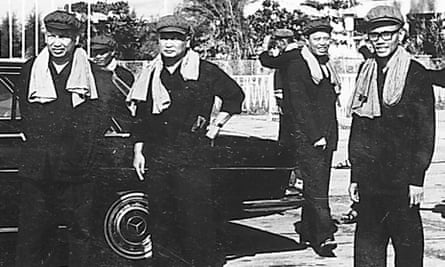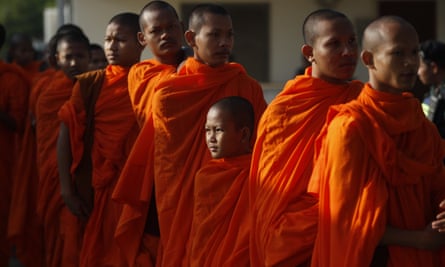Nuon Chea, who has died aged 93, was a lifelong revolutionary who served as “Brother No 2” in the Cambodian communist movement for almost half a century. In this role, he presided over extensive purges of suspected enemies within and outside the ruling party, resulting in the execution of more than 300,000 Cambodians between 1975 and 1979, when the Khmer Rouge regime of Pol Pot controlled what was then known as Democratic Kampuchea.
During his years in power, Chea earned a reputation for dogmatism and ruthlessness. He put into practice the reckless, utopian policies of the party, which included emptying the cities, closing schools and monasteries, abolishing private property and empowering the poorest of the poor. These policies, set in motion at breakneck speed, were enormously costly in human terms: in addition to those executed by the state, almost one and a half million Cambodians are estimated to have died during those years, of starvation, overwork and misdiagnosed diseases.
Nuon Chea was a pseudonym for Lau Kim Korn, also known as Longreth Raodi, who was born to a prosperous Sino-Khmer family in Battambang, Cambodia. In 1941, after Thailand annexed the province, Chea moved to Bangkok, where he completed his schooling, spent some time as a Buddhist monk and enrolled briefly at Thammasat University.
When Battambang returned to French colonial control in 1946, Chea remained in Bangkok, working as a clerk in a government department. He moved in radical circles and joined the Thai Communist party before leaving Thailand in 1950 when an anti-communist regime came to power there.

In Battambang, Chea joined his cousin Sieu Heng in the Indochina Communist party. Heng led the weak and clandestine Cambodian communist movement at the time. Chea studied for two years at party schools in Vietnam before returning to Cambodia in 1955. He helped a former monk, Tou Samouth, run the urban branch of the movement, and he worked closely with a young schoolteacher, Saloth Sar (later known as Pol Pot), who had recently returned from France.
In 1958 Heng defected from the movement, which was reorganised as the Workers’ party of Kampuchea two years later, with Samouth as secretary general and Chea as his deputy. Soon afterwards, Chea travelled in secret to North Vietnam, where he explained the policies of the newly formed party.
Samouth was assassinated by Prince Norodom Sihanouk’s police in 1962. Sar replaced him, bypassing Chea, who was in line for the position. The rationale for the decision, and Chea’s reaction to it, are not recorded, but for the next 35 years he served loyally and efficiently as the second in command of the Cambodian Communist party.
When Sar, fearing arrest, went into hiding on the Vietnamese border in 1963 with several colleagues, Chea stayed behind in Phnom Penh, undetected by Sihanouk’s police. After Sar’s return from visiting North Vietnam and China, Chea joined him in a new party base in the remote north-east of Cambodia in 1968.
Following a pro-American coup against Sihanouk in 1970, Chea, using some of his contacts with the North Vietnamese, got their help to build up a revolutionary army with which to depose the new regime. The communists were victorious in April 1975, and Chea returned to Phnom Penh as Pol Pot’s second in command.
Chea made sure that the command structure of the party– which included himself, Pol Pot and perhaps a hundred others – was always concealed and physically secure. According to testimony at the Extraordinary Chambers in the Courts of Cambodia – the so-called Khmer Rouge tribunal which started work in 2006 – Chea personally approved the arrests and executions of hundreds of senior and mid-ranking party figures suspected of betraying the state.
Because he had joined the Indochina Communist party in 1950, he was considered trustworthy by the Vietnamese communist regime, but his former mentors underestimated his nationalistic fervour. Interviewed by a Danish communist delegation in 1978, Chea stressed the overriding importance of secrecy in Democratic Kampuchea and suggested that the party’s principal mission was to protect its leaders.

When the Khmer Rouge was driven from power by a Vietnamese invasion in 1979, Chea joined Pol Pot and a handful of surviving officials in Thailand, where the Khmer Rouge gained support from the Thai government, and indirectly from China and the US.
The Cambodian communist movement began to fragment in 1997, and Chea shifted his loyalties to its new leader, Ta Mok. In December 1998, after Pol Pot had died, Chea defected to the Cambodian government in exchange for an amnesty, and settled with his wife and children in the town of Pailin on the Thai-Cambodian border, where he lived very modestly.
When the United Nations-sponsored tribunal set to try the leaders of Democratic Kampuchea finally convened in Phnom Penh, Chea was arrested in 2007 and imprisoned. He was indicted for crimes against humanity in September 2010, and went on trial in June 2011, alongside his former colleagues Ieng Sary, Khieu Samphan and Khieu Thirith.
At one point in the proceedings, Chea made a 90-minute speech that amounted to a plea of not guilty. He blamed the excesses of the Khmer Rouge on “unruly elements” and claimed to have worked tirelessly as a patriot to prevent Cambodia being obliterated by Vietnam. From his perspective, he had presided over a legitimate, unjustly persecuted regime with efficiency and dedication.
Nevertheless he was found guilty of crimes against humanity in 2014, and of genocide in 2018, and was sentenced to life imprisonment.
